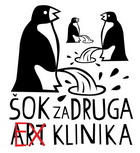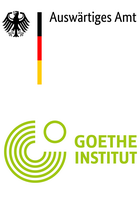Olga Timofeeva: You choose the profession, not the nationality
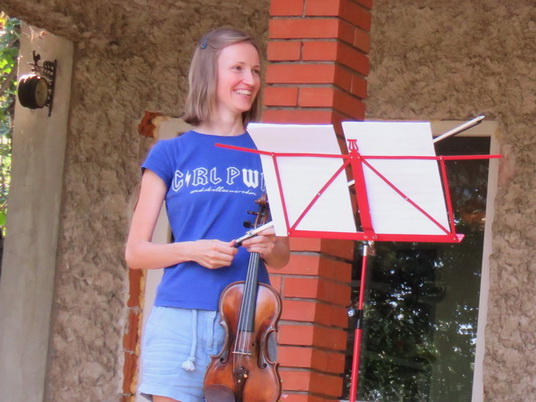
Olga Timofeeva, a violinist at the Mariinsky Theater in St. Petersburg until the beginning of the Russian invasion of Ukraine, is upset when she talks about her professional life before the war began. Following her husband Andrey Timofeev, also a successful violinist, she left Russia and settled in Vienna, but due to the expiration of her Schengen visa and the inability to renew it, she came to Serbia in June.
In an interview for SEEcult.org, Olga Timofeeva talks about the reasons for leaving Russia, the new feeling of freedom to be able to speak and protest about the war without fear of arrest, but also about the difficulties in finding a professional engagement and at the same time the readiness at any moment for the case something goes wrong.
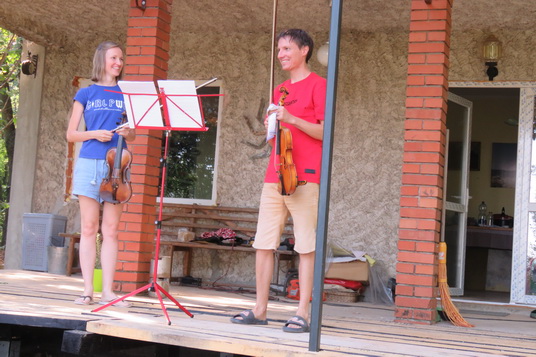
Olga and Andrey Timofeev, ZMUC, Babe, 2022.
- How will you remember the time of your arrival in Belgrade?
Olga Timofeeva: I came to Belgrade after spending three months in Vienna, separated from my husband, I was very lonely there. During that time there were many difficulties and failures, I felt like a helpless kitten struggling in the mud. I only fantasized about seeing Andrey as soon as possible. And the day I finally came to him was the happiest day in a long time. Of course, the incredible help of the Artists at Risk organization, which found us a residence in Belgrade in a few hours, made me look to the future with optimism. Goran Denić and Vesna Tašić from ZMUC surrounded us with care and great support. In addition, hospitable Serbia has a lot in common with Russia in everyday life and culture, so I felt at home in Belgrade. And especially precious to me is the new feeling that I can talk about topics that concern me without fear of someone betraying me; that I can protest against the war, speak at anti-war exhibitions and express my opinion, and that no one will beat me with a baton or push me into the "police car" for this.
- When did you leave Russia and where were you when the war in Ukraine started?
Olga Timofeeva: We were in Russia on February 24. I remember, when I saw Andrey that day, we just hugged each other and couldn't say a word the whole day. It was business as usual at work, but there was anxiety and confusion in the air. Colleagues tried not to discuss what was happening. At that time, no one dared to express their position, as if people were waiting for a sign as to exactly how they should behave. A long time ago, I created a page on Facebook and I wrote: "Let there be no war". It always seemed to me to be an unshakable postulate and I could not even imagine that it would become a forbidden expression in an instant.
As soon as we arrived in Vienna, we started sending applications for various auditions to orchestras. But that process is not always fast - applications are submitted well in advance. So, I only managed to go to four auditions in the Schengen zone until my visa expired. And winning the competition in just three months is extremely difficult. There is a lot of competition in Europe and many even very good musicians have been auditioning for years. In Vienna, even more so - an excessive concentration of violinists per square meter. But luck smiled on me in the Czech Republic and on the penultimate day of my visa I passed the Pilsen Philharmonic competition. I came to Serbia absolutely happy, and two days later I found out that the Czech Republic has stopped issuing any visas to Russians, including work visas.
In the beginning, it was not clear which occupational categories were under the ban. I hoped that my specialty in the field of culture could be an advantage, I turned to Czech lawyers who consulted with the Ministry of Foreign Affairs, tried to win the support of the Philharmonic from Pilsen. But the law turned out to be so strict that many people did not even renew their already issued residence permits. I realized the futility of all my efforts and I didn't even submit the documents for that visa. Of course, this was a big disappointment for me - another door slammed right in front of my eyes. Then other countries started to join the Czech Republic. I think that process will continue. Of course, every country has the right to decide on its own security issues, to choose ways to achieve it, and it should do so. And I really hope this will help them stop the war.
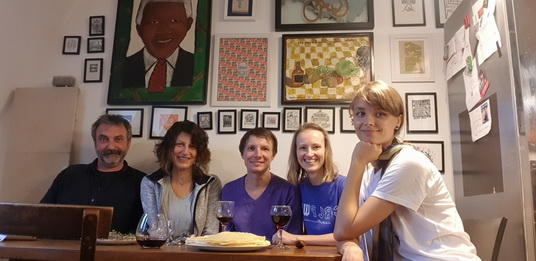
Goran Denić, Vesna Tašić - ZMUC, Andrey and Olga Timofeev, Ksenia Ilina, Belgrade, 2022.
- The Academy of Arts in Vienna launched an extraordinary PhD curriculum, to which you and Andrej applied? What happened to that application?
Olga Timofeeva: That Academy often deals with the problems of students, artists who find themselves in a difficult situation, constantly provides support to LGBT people, refugees. We learned that this year the Academy decided to allocate additional places for Ukrainians, Belarusians and Russians. We submitted the admission documents, passed the entrance exams. But in the end they turned us down. We still don't fully understand why this happened.
- Was there an answer and explanation after you were rejected?
Olga Timofeeva: As far as we understand - these places were supposed to be outside the main competition. We, classical musicians, would hardly be able to enter the Academy of Arts under the general conditions. But it seems that the Academy did not have any laws and rules to regulate it. Maybe they had some internal disputes so we were not accepted. I can only guess because they didn't explain the reason. They just wrote that we didn't pass the last stage of the exam. But as far as I know, all the other guys (including the Russians) from this extra set got in.
- What is your next step career-wise? You are waiting for the Bulgarian authorities to approve your work permit. What are your expectations?
Olga Timofeeva: In the past nine months, we have experienced so many losses and failures that we now see every new closed door as an inevitability. This step failed - ok, let's move on, make a new plan. We are already prepared for the fact that at any moment something may not go according to plan, that something may be tightened, canceled...
- A similar thing happened with the Pilsen Philharmonic when the Czech Republic decided not to issue visas to Russian citizens. How did you react to that kind of discrimination?
Olga Timofeeva: Despite the fact that the feeling of shame and collective responsibility constantly accompanies me and may already stay with me forever, I cannot say that I am happy about these discriminations. So it happened that now nobody is interested in my rights - neither in the country, nor abroad.

Olga Timoffeva, ZMUC, Babe, 2022.
- Do artists have an identity other than ethnicity/nationality?
Olga Timofeeva: Art evokes the same feelings and emotions in people anywhere in the world, regardless of their nationality. Of course, the artist always, consciously or unconsciously, relies on the national cultural tradition in his work. But not excluding that, in the end he/she always strives for individuality and freedom of expression. And when the state and dictatorship try to force the artist into certain frameworks, art dies, or goes underground and to allegory. Freedom is the main requirement for art.
- You came to Serbia as citizens of Russia. What do you think of the pro-Russian sentiment here?
Olga Timofeeva: I like it when different nations are friends with each other and when they respect and appreciate each other. But that's how it should be for everyone. I'd rather be treated with such warmth just because I'm human. It is much more pleasant when I say that I am a musician and see how people are imbued with respect for my work. Since it is my choice, I put a lot of effort into becoming a musician. But I didn't do anything to be Russian. When I meet musicians from other countries, I think, "God, I have a lot more in common with them than with my countrymen." Why are people still divided by nationality?"
- What do you think about the possibility of having your citizenship revoked if the new law is passed in the Duma?
Olga Timofeeva: I don't think they will pass such a law. I've already been robbed of a lot. But even if we assume that this will happen, they will not be able to take away my nationality, homeland, past, my roots, but they will not deprive me of my guilt and bitterness, my conscience. They will bring me problems, but they will not deprive me of anything.
- Are you in contact with family, friends and colleagues who remained in Russia? How do you feel now compared to when the war started?
Olga Timofeeva: Unfortunately, none of my relatives in Russia understood me or supported my decision to leave. I became quite estranged from my mother, although I was always close to her. Now there is an abyss between us. But despite that, I don't cut off contact with her and I still have a small hope that our relationship will not disappear forever, that one day we will be able to overcome our differences. My friends, on the contrary, support me, and many of them have also gone to other countries. I have relatives in Ukraine, some of them do not speak Russian in principle now, some of them no longer communicate with me. I'm just waiting for time to pass and I'll try to rebuild all the bridges.
Yes, I really miss my home, my relatives, my beloved Petersburg, the city where I was happy; my beloved theater, which has given me a lot. I'm glad it happened in my life. It will never be the same again, but it will be something new and I am more and more interested in what awaits me next.
- Where do you play in Serbia? Is your career at a standstill, has it blossomed or collapsed?
Olga Timofeeva: When I left Russia, I was firmly convinced that I would rather wash the floors in another country, but I will not give a single kopeck of my taxes for military aggression. We didn't have any plan to find a job in the short term. But I am very grateful to the wonderful organization "Artists at Risk", as well as to Goran Denić and Vesna Tašić, who gave me a helping hand and thanks to whom I can continue to do what I love. I started performing regularly as part of a symphony orchestra, as well as solo. I am glad that I have already managed to perform on different stages in Belgrade and other cities. My career first stopped a little, but now it is restarting, new ideas and experiments are appearing, for which there was not enough time before.
*Photo: ZMUC
(SEEcult.org)
*Funded by the Stabilisation Fund for Culture and Education 2022 of the German Federal Foreign Office and the Goethe Institut







